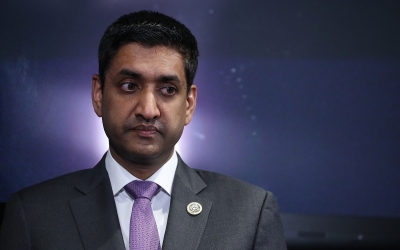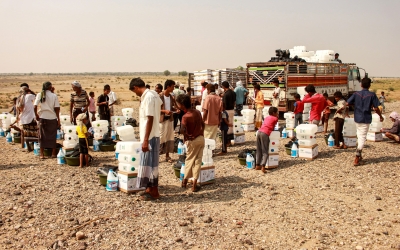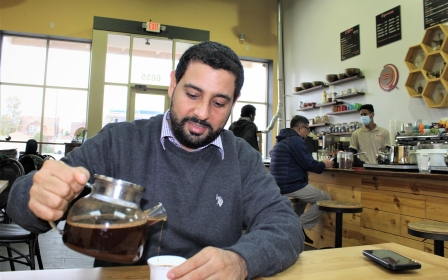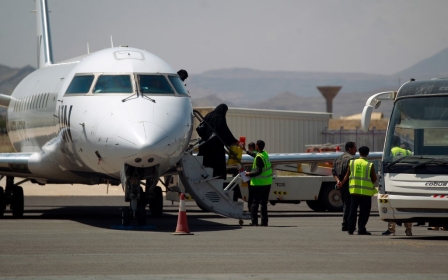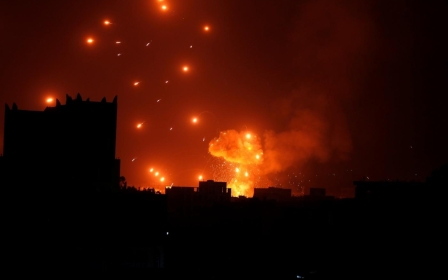UN, aid groups warn US against blacklisting Yemen's Houthis
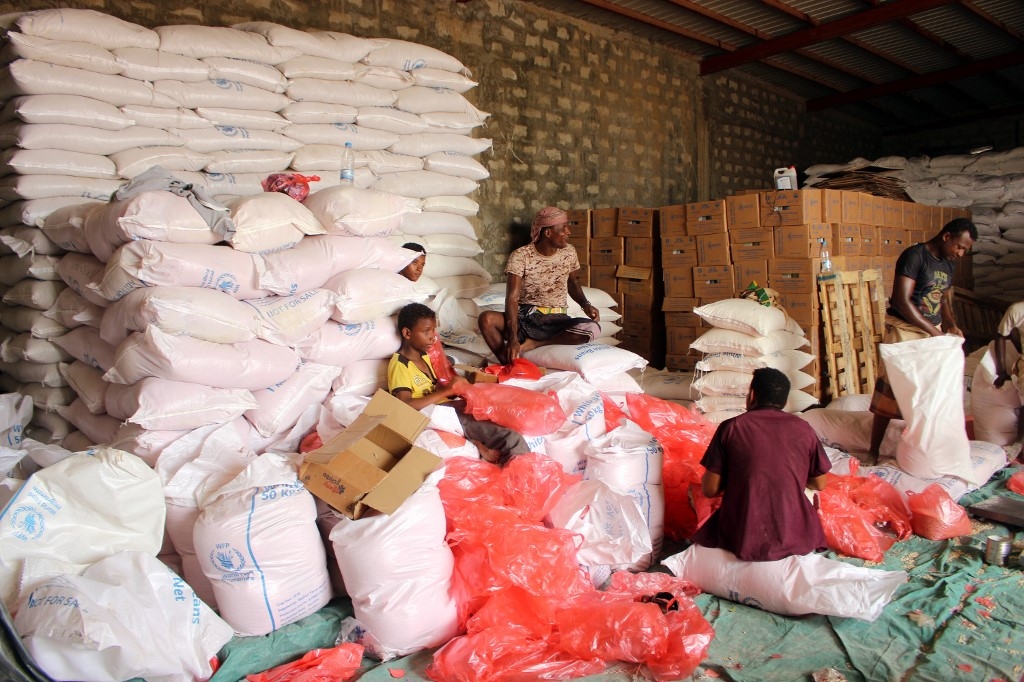
The United Nations is making a last-ditch appeal to the administration of US President Donald Trump regarding the humanitarian situation in Yemen, urging Washington against designating the Houthi rebels as a terrorist organisation, which would derail a $700m aid programme to the country.
On Tuesday, David Beasley, executive director of the UN's World Food Programme (WFP), had a meeting with US Secretary of State Mike Pompeo, where he expressed "grave concerns" about blacklisting the Houthi group. Beasley later told the Washington Post that the designation would have an impact on humanitarian aid to the country.
New MEE newsletter: Jerusalem Dispatch
Sign up to get the latest insights and analysis on Israel-Palestine, alongside Turkey Unpacked and other MEE newsletters
"WFP is deeply concerned about the potential impact of a decision by the US to designate Ansar Allah as a foreign terrorist organisation," a WFP spokesperson told Middle East Eye, using another name for the Houthis.
"It would heighten the gravity of an already severe humanitarian crisis in Yemen."
Beasley also met with US Senator Todd Young, who along with fellow Senators Chris Coons and Chris Murphy advised Pompeo not to move forward with the terrorist designation.
Since the Houthis took over much of Yemen beginning in 2014, the rebel group has exerted significant influence and control over the country.
The group controls the capital Sanaa as well as the port of Hodeidah, and humanitarian groups have no choice but to work through the Houthis in order to deliver aid to areas where roughly 70 percent of Yemeni civilians reside.
In March 2015, the Saudi-led coalition started a military campaign against the Houthis to restore the government of President Abd Rabbuh Mansour Hadi. The United Nations has described the conflict as the "worst humanitarian crisis" in the world.
Unicef also expressed alarm at the potential move, without directly mentioning the Trump administration.
"Like all humanitarian organizations operating on the ground, UNICEF would be deeply concerned about any decisions that could compromise the safety of our teams and their efforts to assist vulnerable children and families," a spokesperson for the UN humanitarian agency that focuses on children told MEE.
'High-profile name-calling'
Multiple reports say the Trump administration, which sees the Houthis as an Iranian proxy group and is a close ally of Saudi Arabia, is planning to blacklist the group, slap sanctions on its leaders and halt the $700m aid programme to Yemen.
The potential designation aligns with the administration's efforts to assert its "maximum pressure" campaign on Iran in its last weeks of office, before President-elect Joe Biden is inaugurated on 20 January.
Iran, meanwhile, denies it provides material support to the Houthis in Yemen.
In March, USAID halted millions of dollars of assistance to north Yemen - citing "unacceptable interference" by the rebels that control the region.
'The final analysis boils down to whether it’s worth sparking the largest famine in recent decades in order to engage in high-profile name-calling'
- Scott Paul, humanitarian policy lead at Oxfam
While Beasley expressed to Pompeo the need for securing sanctions waivers in order to allow aid groups to continue their work, a terrorist designation would have far greater consequences for the country.
Scott Paul, the humanitarian policy lead at Oxfam America, said that a foreign terrorist organisation designation would create a situation in which all aid work would be criminalised, and no licences or authorisations for aid work would be available.
Paul noted that the US government's failure to issue licences for humanitarian assistance to Somalia in 2011 helped contribute to a famine that took the lives of a quarter-million Somalis.
And in Yemen, where the threat of famine is rising, aid organisations are worried about an even more disastrous situation.
"The final analysis boils down to whether it’s worth sparking the largest famine in recent decades in order to engage in high-profile name-calling," Paul wrote on Twitter.
Dwindling aid and rising famine
The war in Yemen has caused more than 100,000 deaths, destruction of civilian infrastructure including schools and hospitals, and brought the country to the brink of famine.
In November, UN Secretary-General Antonio Guterres warned that Yemen was in "imminent danger of the worst famine the world has seen for decades". He said that mass starvation could kill millions of people in the war-torn country.
Aid groups have continued to operate in Yemen, working to deliver as much humanitarian assistance as possible.
A WFP spokesperson said the organisation provides emergency food assistance to 13 million people in Yemen. Still, 8.5 million of them have only been able to receive this assistance on alternate months since April, amid funding shortages.
The humanitarian agency said it needs at least $1.9bn in 2021 to provide the minimum amount of food assistance needed to prevent widespread famine.
"This would provide survival rations to 13 million people with most getting only half their daily ration (1,100 kcal) and the most vulnerable getting four-fifths of their daily calorific needs," the spokesperson told MEE.
"With current available funds, WFP is unable to even meet this level of assistance. WFP is short US$442m for the next six months (December 2020 to May 2021)."
Middle East Eye delivers independent and unrivalled coverage and analysis of the Middle East, North Africa and beyond. To learn more about republishing this content and the associated fees, please fill out this form. More about MEE can be found here.


